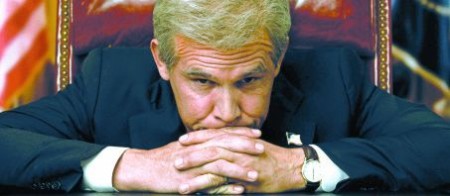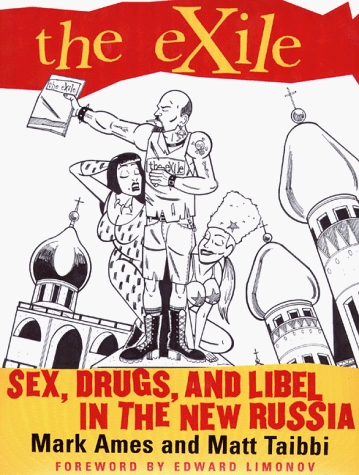Don’t be fooled by how amusing this image looks.
You ever sit through the rough cut of your friend’s independent film? Well, I have, lotsa times, God help me, so seeing Oliver Stone’s W. really brought back some nauseating memories. It seems to run about eight hours and is so boring, so fatheaded, and so full of lame attempts at profundity that it’s just like the rough cut of almost every terrible independent film ever made. You can practically feel the director sitting behind you while it unspools, breathing on the back of your neck and willing you to see the brilliance of his vision.
For reasons that elude me, the majority of major film critics are playing along with the director on this one, at least to the point of expressing their criticisms very, very gently. This makes me wonder if most of them were actually with Oliver Stone, at some point, in a seedy rented screening room where rough cuts are so often shown. Perhaps they felt the obligations of friendship that weigh so heavily after the screening, when the fatheaded pal asks, “So whadja think?”
One of the few critics who’s apparently not a coercible friend of Oliver Stone’s is Anne Hornaday of the Washingon Post who lets loose with this insightful heart’s-cry:
Why this movie — a rushed, wildly uneven, tonally jumbled caricature — and why now? Why, when Americans and citizens around the globe are still coming to terms with the implications of so many Bush policies, would they want to pay money at the box office to see what amounts to an extended “Saturday Night Live” skit?
Why, when so many people are familiar with the vignettes that drive the episodic narrative of “W.” — the Time Bush Choked on a Pretzel, the Time Bush Quit Drinking After a Brutal Hangover, the Time Bush Invaded Iraq — would they want to see it all reenacted again, albeit through Stone’s occasionally stingingly satirical lens?
As Bush himself might say, the answers to those questions are between you and your God.
The only problem I see with Hornaday’s take is that she makes the movie sound too good. Calling Stone’s lens “occasionally stingingly satirical” is giving that lens way too much credit, and the strain of praising Stone is probably what caused her to overdo the adjectives and muck up her sentence so badly. Even comparing W. to an extended Saturday Night Live skit is way too generous: some of those skits are pretty funny for a minute or two, anyway, and now is exactly the dire time when we all want to watch those skits. But at least Hornaday’s observation gets us closer the experience of the film itself.
W. really is a bunch of often-terrible skits spun together and splatted out onto the screen as if fired from a salad-shooter. The skits are all played in different tones, all of them going on way too long, and all of them hinging on the fascination of watching good actors impersonate George W. Bush and his circle of grotesques. There’s Josh Brolin playing W. as a rube failing upwards into the White House, featuring great work on Brolin’s part. But unfortunately Stone keeps undercutting the fantastic all-out black comedy he could’ve made out of that performance, instead sticking poor Brolin into the dumbest Oedipal melodrama I’ve ever seen in my life. There’s Richard Dreyfuss’ Dick Cheney—far too warm and personable, nothing like the Central Casting evil capitalist fatcat we’ve marveled at all these years. Thandie Newton’s Condoleeza Rice doesn’t get a lot of screen time, which probably helped her achieve this wonderfully vicious rip into Condi, a real skit masterpiece—get her over to SNL right away! And so on through Jeffrey Wright’s tortured Collin Powell, Scott Glenn’s checked-out Rumsefeld, Elizabeth Banks’ nice-gal Laura Bush, James Cromwell’s indignant WASP Poppy…zzz…zzz…
Where was I? Oh yeah, how much this movie absolutely reeked. I only went to W. because the ads looked surprisingly good. I’d sworn off all Oliver Stone movies after Nixon. (God, what a stupid movie. Stone had Anthony Hopkins playing Nixon as such a hunched, deformed, creepy Quasimodo character he could never have gotten elected for anything but medieval bell-ringer at Notre Dame.) But this one looked different; the comedy seemed to be on purpose. There was Brolin doing this hilarious skewering of Bush, and I thought, jeez, maybe Oliver Stone has finally given up blowhard bathos and is playing to his strengths, turning his gift for the grotesque toward humor, where it belongs. But don’t be fooled; the ads represent only the dedication of the film’s PR team in searching through tons of idiotic footage and pulling out the few good bits for the preview. As is so often the case with movies lately, the marketers are smarter than the filmmakers.
If you decide to go see W., just be warned that, once again, Oliver Stone thinks he has some sort of profound insight to share with you. In this case, it’s W.’s daddy issues. Stone thinks it’s so interesting that W. spent his whole life trying to measure up to his father H.’s high standards that he’s staged approximately 57 scenes of father-son confrontation. It’s typical of Stone that he doesn’t seem to recognize the utter silliness of these 57 scenes. He plays them straight. Clearly, to Stone, it’s serious when W. finally makes good, and Poppy gives him a family heirloom—the Talismanic Cufflinks of Grandpa Preston, founder of the Bush fortune. And it’s serious when W. is crushed by this paternal gesture, because Poppy only gives him a loving note along with the cufflinks, instead of, I don’t know, kissing him full on the lips and saying “You complete me.”
Stone doesn’t seem to understand that some people have real problems. Some people with daddy issues have daddies they’ve never met, say, or daddies who used to beat them daily just to keep their whipping arm limber. But Stone’s heart really seems to bleed for poor W., whose daddy merely gave him a chunk of the family fortune, all the contacts he could ever use, fifty chances to succeed in the professions of his choice, the family cufflinks, and several very affectionate notes. What a neurotic, withholding bastard that H. was and is!
Anyway, that’s the coherent part of the narrative. The rest is pure salad-shooter. I’ll warn you of just three other things before you make up your mind to go or not:
1. At the Texas barbeque where W. meets Laura, there’s a giant close-up of a corn-cob on the ground that gets stepped on. You’re watching the scene, waiting for the tiresomely inevitable hook-up, when suddenly there’s a massive corn-on-the-cob-in-the-grass shot featuring a lovingly-detailed foot crunching over it. In its perverse weirdness it’s worthy of Salvador Dali, but heaven knows what the hell it’s doing there. Right after that W. and Laura are face-to-face and the rest, to our sorrow, is history. Anyone out there familiar with corncob symbology? Is it just your basic phallic terror as W.’s about to get his own corncob crunched, or is corn the State Vegetable of Texas, or what?
2. There’s a crazy-cam effect you have to watch out for that keeps popping up in the film. It’s when the outer circumference of the image all goes blurry; it looks sort of like in old movies when they were trying to establish the subjective experience of a nutcase having a hallucination. Sometimes there’d be a swirly pattern over everything, but blurry edges were popular too. In W. the effect doesn’t relate to anything concrete like drunkenness. It just pops up now and then for the hell of it.
3. Somewhere into the film you’ll experience Mid-point Panic, when you realize that Stone & Co. are determined to plod through huge swatches of W’s life story, shuttling backward and forward between the Iraq War “present” and everything that happens in the past leading up to it, from Yale fraternity hazing on up. Mid-point Panic will occur at different times for different viewers: it seized me just as W. announced he intended to run for governor, and I suddenly thought, wait, we’ve been sitting here for three hours at least and he isn’t even governor yet? O merciful God, will I ever see the light of day again?
Other critics were apparently untroubled by the film’s unendurable running time. (129 minutes is what they advertise, but don’t you believe it. Take the running time for Gone With the Wind and triple it. By the time you get out of the theater the election will already be over.) Here’s the strangely zen Kenneth Turan of the L.A. Times displaying his imperturbable bad-film-viewing abilities:
…W. is not a dispassionate biography; it is an interpretation of personality intersecting with history, and as a piece of drama it is persuasive and perfectly creditable. Its vision of an ordinary man in extraordinary circumstances, of a creature of terrible earnestness overmatched by the situation he’s in, certainly gives Americans something to think about.
I’m not sure what Kenneth Turan is on when he watches movies like W., (Ketamine? Dopamine? Dramamine?) but whatever it is, I want some.
Read more: america, Colin Powell, Condaleeza Rice, Dick Cheney, Donald Rumsfeld, election, George Bush, Oliver Stone, W., Eileen Jones, Fatwah


Got something to say to us? Then send us a letter.
Want us to stick around? Donate to The eXiled.
Twitter twerps can follow us at twitter.com/exiledonline















